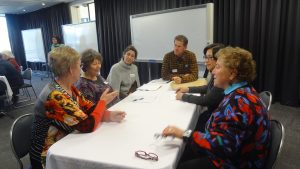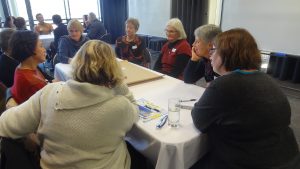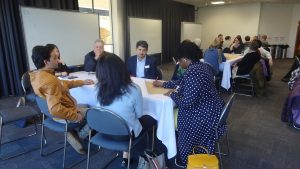On 13 July 2018, the Centre for Global Migrations and Collaboration of Ageing Research Excellence hosted a joint symposium on migrant elder care. Five speakers traversed topics of care for Chinese elders, community gardening for senior migrants, interpretation issues for migrant elders, spirituality, and migrant care workers in elder care facilities.
Following the five presentations, participants moved into groups to brainstorm challenges within the migrant elder care sector. Key findings and recommendations include:
- Government should fix loopholes in the existing immigration legislation rather than close the family reunification category. For instance, migrant elders (grandparents) can visit New Zealand multiple times but only up to 6 months at a time with a maximum stay of 18 months in three years. This regulation fails to recognise the value that migrant elders (grandparents) have in providing long-term support and care to their children and grandchildren;
- For migrant elders in New Zealand, ascertain whether there is a need to establish a group to facilitate migrant elders to better connect with their local communities. If desirable, a key person needs to drive the initiative forward with support from a critical mass;
- Seek to facilitate group mingling between migrant elders of different ethnicities to develop cultural learning, respect and understanding.
- Recognise the need for a sustainable immigration policy to retain migrants, including a special category or better recognition for care workers. Current policy for an Essential Skills Work Visa in ‘lower-skilled employment’ stipulates that after three years in the country, applicants must spend a year outside New Zealand before being granted another visa. Under this category, applicants are also prevented from bringing their families to New Zealand to join them. This is problematic in light of the investment employers make in relation to job training etc.
- Recognise the demands on migrant care workers who often have to: refund a migration agent in their homeland; repay their families for financial support; provide remittances for their kin; and cover their own expenses. The practice of sending remittances back to points of origin could be alleviated if immigration policy permitted family reunification.
- Establish regular/ongoing workshops that support workers in the migrant elder care sector to better understand the impact of cultural perspectives in care homes.






